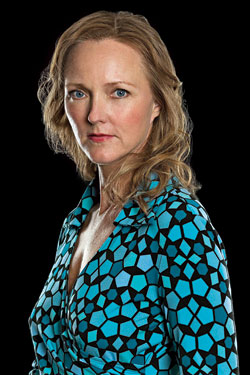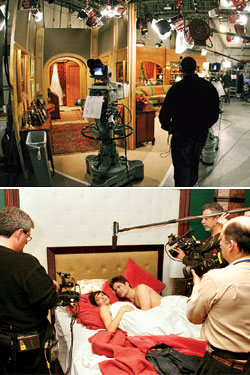
After more than 50 years of surrogate births, shotgun weddings, sordid divorces, steamy affairs, and myriad multiple-personality-disorder diagnoses, it seems the most unthinkable scenario is about to play out: TV soap operas are edging toward a dramatic death. Perhaps that’s why Ellen Wheeler is praying in church.
Wheeler is the executive producer of Guiding Light, CBS’ long-running soap. In fact, it is the longest-running show in broadcast history. And this quiet former Episcopal church with a few remaining pews is actually part of her midtown office, which doubles as a television studio, with crosses and votive candles strategically positioned by production assistants. A place of hope is the ideal location for Wheeler’s show, which, like all soaps, is losing viewers faster than All My Children’s Erica Kane goes through husbands. But Guiding Light is pulling in the fewest viewers of all (2.5 million daily viewers, down more than half from ten years ago).
“I get teary, and I hate that,” Wheeler says. Her tendency to choke up in the middle of a conversation could be attributed to either her nightly four hours of sleep or to her former career as a soap star. (Her portrayal of good-and-evil twins Vicky and Marley Love Hudson on Another World earned her the 1986 Daytime Emmy Award for Outstanding Ingénue in a Drama Series.) “If you listened to the New York Giants throughout [last] season, they really believed in themselves when no one else did. We also believe in ourselves. We have nowhere to go but up.”
The villain in this piece is the reality show. When veteran soap-opera producer Mary-Ellis Bunim created The Real World for MTV in 1992, soap opera’s exclusive grip on emotionally manipulative programming began to loosen. “They’re closer cousins than most people realize,” says TV historian Ron Simon. “If you look at the Internet chat boards for soaps and reality shows, the audiences are asking the same question, ‘Why is the character doing this?’ They’re both a way to measure your own life.”
Recently, however, in true dramatic-plot-twist form, Wheeler came up with a plan (cue swelling synthesizer music)—a plan she thinks could not only save Guiding Light but quite possibly be the biggest thing to happen to soaps since Guiding Light made the jump from radio to TV in 1952.
Where other daytime producers are amping up the supernatural plots and onscreen text messaging to attract viewers, Wheeler has given her show an extreme makeover, reality-show style. For the first time, fans can see the actual streets of Springfield, a midwestern town in an undisclosed state—which look suspiciously like the streets in Peapack, New Jersey, where one-fifth of the scenes are being shot, all with handheld cameras. “We finally get to come into their world,” says Wheeler, who was inspired by shows like Laguna Beach and Friday Night Lights. The result is a film-schoolish mishmash of extreme close-ups and shaky, occasionally seasickness-inducing long shots filmed through window frames or the leaves of a houseplant.
Gone are the generic and cheap-looking sets, the static filming, the heavy makeup. Even that cheesy synthesizer music has been replaced by scruffier cheese: Matchbox Twenty–style rock.
“CBS has the oldest median age of a broadcast network, and reality shows draw a much younger target audience than daytime dramas,” says Brad Adgate, a New York media analyst who studies the women’s market for advertisers. “If there’s a magic bullet, this is probably going to be it.”
The stereotypical soap viewer is the older housewife, but the shows have historically picked up a lot of fans on college campuses. With its face-lift, Guiding Light is banking on pulling in a whole new generation of viewers. “I do think if you were flipping through the channels you wouldn’t say, ‘Oh, this is a soap opera, I’m not going to stop,’ ” says Wheeler. “You wouldn’t know what it was.”
Going outside the soap box is nothing new at Guiding Light, which has pushed plots into the outer limits of ridiculousness. In an attempt to boost ratings at the turn of the millennium, the much-beloved “Red Hot” Reva, who had recently been cloned, began using an oil painting to travel to Civil War New Orleans and Edwardian England. As delightful as that sounds, ratings began to fall. By 2007, the show was ranked No. 8 out of nine daily daytime dramas (ahead only of the now-canceled Passions, whose cast included a witch and an orangutan).
When Wheeler started as executive producer in 2004, she wasted no time ejecting the supernatural plot twists and B-stories (one of which featured a mobster and a fiendish royal family on the mythical island of San Cristobel) and planted the show firmly back in the Midwest. This is not to say that the family tree (and yes, in the great tradition of soaps, many of Springfield’s residents are connected by one family tree) is not mind-bogglingly Byzantine. “It’s like trying to learn all the kings and queens of England,” concedes Wheeler, who continues to champion such soap standards as split second marriages, overlong pauses, and characters who dramatically recite their text messages as they compose them.

Other changes included promoting a 29-year-old intern turned writer to the head writing team and creating a five-person technology department that oversees daily podcasts and video features. And after seeing the film adaptation of Jonathan Safran Foer’s novel Everything Is Illuminated, Wheeler decided to start broadcasting weekly “illuminated” episodes that would focus on one character.
This year, Wheeler made her biggest mark yet with the debut of the show’s spiffy new set—a dollhouselike structure with two layers of anodynely decorated four-walled rooms and “breezeways” stacked on top of each other. “It used to be that if you needed a court scene and the set wasn’t up, you’d just write a scene with the judge talking about a case at a restaurant,” Wheeler says. “With our new sets, everything’s ready all the time … We wanted this city to be a real place.”
Scrapping the old, paper-thin sets that had to be erected every morning by a crew of now laid-off stagehands cut production costs by 10 percent. Daniel Cosgrove, the Beverly Hills, 90210 alum who plays Bill Lewis, an oil prospector who went blind and (naturally) regained his sight, finds the changes bittersweet. “It’s exciting, but it’s sad at the same time. In any change in business, some people are going to lose their jobs. Most actors are [here] to make art, but let’s face it. There’s a reason the name ‘soap opera’ was coined—[these shows were created] to sell soap.”
The actors generally approve of the reality-style shooting, which leads to a fresher kind of acting. “It’s less like shooting a play,” says Murray Bartlett, who plays Cyrus the Australian jewel thief. “Now you can lose yourself in the environment. It feels more intimate, and you can hopefully be more subtle.”
There’s no indication that all this radical retinkering will save the genre. Certainly, it will never see the like of its mid-eighties heyday, when some 50 million people—mostly women—were watching at least one show. So far, it hasn’t even paid off for Guiding Light. When the “new” show debuted on February 29, there was the expected backlash. Fans immediately hit CBS with online complaints about the artsy flourishes (producers have toned them down). “These shows are created to be romantic fantasy and fantastical adventure,” says TV Guide’s soap columnist, Michael Logan. “We don’t want reality when we’re watching a soap. We want a ‘Calgon, take me away’ moment.”
A little over five months later, viewership is still hovering below last year’s average of 2.6 million. And yet the industry is taking note. Producers from other networks have been dropping in at the new digs to check out Wheeler’s revamp, suggesting that even if her changes haven’t paid off yet, there’s a feeling they will. “Let’s put it this way: I don’t think they’re making social calls,” she says.
Should the unspeakable happen and Guiding Light get canceled, it’s unlikely the rest of the underperforming shows will be spared. Will anyone care except the soap fanatic? “The thing about soap operas that’s so special is they make you realize how similar we all are,” says Wheeler. “Oh, gosh, I’m going to get sad.” Her voice catches, and she pauses to wipe a tear away. “Sometimes we feel very isolated and on our own, and soaps give you a chance to look at other people’s lives and say, ‘I’ve felt just like them. I’ve never had a beautiful Australian come out of the blue and fall in love with me, but I’ve felt the way Marina feels.’ ”
Ellen Wheeler is a believer through and through. If anyone can save the soap, she can. Still, it wouldn’t hurt to light a few more votive candles.